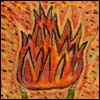It's been 190 days since my husband, Rabbi Captain Shmuel Felzenberg, left from our base in Hawaii to Kuwait and eventually to Iraq. Not that I am counting. Nor do I know the very exact amount of days (and minutes) that remain until his anticipated return in February, 2005. Even if I did, it wouldn't matter much, as these deployments always seem to get delayed and the only way to not be disappointed is to not have any expectations.
But it's not so easy when you are planning your first Bar-Mitzvah for your oldest child and must make all the decisions on your own. Granted, it may seem a bit petty to track him down in Iraq for his opinion on the invitations, but sometimes these details seem to be important.
Ultimately, it is all part of the territory of being married to someone serving in the US Army. And I must say, from the outset, that I don't believe there is any woman or US citizen who could be prouder of the job and role that her husband is serving.
It's funny, because people don't necessarily expect to hear such patriotic statements coming from someone like me. You see, we're not one of those "military families"; in fact, no one in my family ever served in the army. I was raised as an Orthodox Jew in New Jersey, where I worked hard on my academics in Chabad schools my entire life.
So you are probably wondering about my husband. He, too, was raised in an Orthodox home, became involved with Chabad a little later in life, learned in the Morristown Yeshivah, the Rabbinical College of America, and continued on to get his rabbinical ordination from Kfar Chabad in Israel. Also not exactly the type of guy you'd expect to be serving in Iraq.
But I guess when something is truly right for you, no matter how seemingly impractical or out of the ordinary, you find yourself doing what you are meant to do. And without question, my husband is meant to be in Iraq right now, serving his country and serving as a Kiddush Hashem (a sanctification of G‑d's name) for the entire world to see.
From the time we were first married, I remember my husband talking about wanting to join the army. He thought it was a tremendous opportunity to experience new things and use his outreach and rabbinical skills. At first, I didn't think it was something he would seriously pursue, but over the years he kept mentioning it and I saw it was something he deeply desired. After some time I finally told him that he either had to join or he had to stop bringing it up. He decided to join. That was five years ago.
The biggest question we are asked is "why?" Why would you give up a comfortable life to live on an army base? Why would you move out of a religious environment and neighborhood to a place where your children will have few, if any, Jewish friends? Why would your husband risk his life to be a chaplain in Iraq when he could be a rabbi in virtually any community? And why would you be supportive of all of this?
Granted, all good questions. Yet, in our opinion, our answer is pretty good too. Why? Because as Jews we were created to be a light unto the nations, to illuminate the darkness, and to sanctify G‑d's name wherever and however we can. And that, I believe, is exactly what my husband is doing, and by extension, we, his family, are doing it as well, living on the base.
Shmuel's position in the army is as Chaplain. What this means practically is that he is responsible for taking care of the spiritual well-being of the soldiers in his unit, which currently number about 1000. His job is three-fold: he advises the Command on ethics and the proper way of helping soldiers; he provides spiritual, religious or general counseling for soldiers in need; and he is responsible for arranging religious ceremonies or services. Every chaplain functions both within their faith, and as a unit chaplain. Currently, there are only eight active Jewish chaplains total, and in the entire Middle East there is only one active duty Jewish chaplain (though the army is working on arranging visiting chaplains for Rosh Hashanah and Yom Kippur).
Shmuel has actually made quite a reputation for himself with his daily non-denominational inspirational gathering, which includes the recitation of psalms, and is intended to give each and every soldier the strength and spiritual boost for another difficult day in Iraq, far away from family and comfort. Although he has had some wonderful experiences with some of the Jewish soldiers throughout the years, he is currently assigned to a unit in which there is not a single Jew.
What we have found through our service is that the more we try to help and give to others, the more the US Army works to help us and make our lives as comfortable as possible. For example, when Shmuel recently needed to travel to Afghanistan for a number of weeks, everything possible was done by the Army to ensure that he wouldn't need to travel on Shabbat.
Because of the way Shmuel behaves and respects others, he too is showered with respect. Every year, all military personnel are ranked. Shmuel was warned not to expect the highest rating, since the commanders, each of whom has a limited number of high rankings to give out, often reserve these high ratings for the line officers, and not for chaplains or other positions. Yet Shmuel has received the highest rating for the last four years.
Another recent accomplishment is the RCA (Rabbinical Council of America) award he received for "Chaplain of the Year for Distinguished Service Rendered."
Now I will give you a little background as to our life in the army. After Shmuel started his service, we were first stationed in Washington State, and now, for the past two years, we have been living in Schofield Barracks on the beautiful island of Oahu in Hawaii. Our housing area has about 150 families, and at present, there are perhaps ten fathers who are not overseas.
You can't imagine what it is like when virtually all the men are deployed. There is a camaraderie here that bridges all religious, financial, social, intellectual or racial gaps. We are all families. And we all want our husbands and fathers to return home, safe and sound. Never in my life did I realize I could receive such love and support from those who were not my own family, let alone so many non-Jews. I feel blessed to be living amongst such wonderful people.
Shmuel and I are the parents of six children. Our two oldest, eleven and twelve, are boys, followed by a ten-year-old girl, then an eight-year-old boy, and the two youngest, ages five and eighteen-months, are girls. Our baby was less than one year old when Shmuel was deployed. In order to make sure that she remembers him, we have his picture taped onto her high chair tray so that she can see him whenever she eats. He left videotapes of himself reading bedtime stories and telling Torah lessons to the children. We live in a community where fathers have no choice but to write goodbye notes before they leave, praying they can throw them out upon their return. Unfortunately, we have already lost two men in our unit, who were ambushed in a convoy heading towards Kuwait.
There are also practical difficulties. I home-school my children since Jewish education is not available, and I have to cook absolutely everything from scratch. But these things seem so petty in comparison to the thousands of soldiers dedicating their lives to protecting our freedom. Fortunately, we live driving distance from the Chabad house in Honolulu, so whenever possible, we attend events and gatherings so that my children can play with other Jewish children and be part of a community. Furthermore, we spend summers with our families in New Jersey where the kids attend camp, so they do get to experience a more typical Jewish community lifestyle, as well.
But raising children in such an environment has also been remarkably strengthening for them. They know who they are, what they are allowed to do, and what they cannot. And I have never seen children who are so proud to be Jewish. The other kids respect them, and the families know they cannot give them non-kosher food and that there are certain days or times they cannot come out to play. And I am still moved to tears when I watch my younger ones explain a custom or Jewish law to a non-Jewish child with such pride and excitement.
So that is basically the "why" of why we are here. Just like everyone else who has a job to do in this world, we are trying to do ours. It just so happens that our life's work landed us, for now, in Hawaii and Iraq. But we know that we are serving a purpose and we definitely see the fruits of our labor. And remarkably, even though we joined to give, we have found that we have gained tremendously as well. There is something to be learned from every situation and every environment, and let me tell you, the army has plenty to teach.
There is one last thing I want to share that has had a great effect on me. I try to use it as an example when I pray or attend shul. Every day, right around sundown, the US flag is lowered and music (called "retreat") is played. The second this begins, every car that is in motion stops, people get out of their cars, those walking come to a halt, children jump off their bikes, and all stand at attention or with a hand over their hearts in the direction of the flag. It is quite moving to witness such a thing as the respect and love for one's country permeates the air. During these few minutes, you could hear a pin drop, anywhere on the base.
I have taught my children that if this is how people can treat the flag, so much more so, how we as Jews must behave toward our holy Torah. My children have learned what it means to have respect and awe.
So as I continue to prepare for my son's Bar-Mitzvah, and count the minutes until my husband returns, I feel extremely grateful to G‑d for the opportunities He has given us. I have witnessed first-hand that the more you give, the more you truly gain.






Join the Discussion